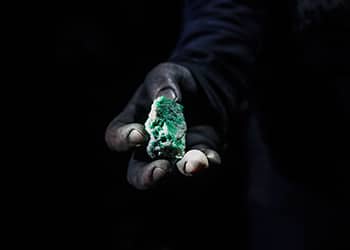The United States has requested the extradition of several Colombian emerald magnates on drug trafficking charges, marking the first time US authorities have targeted members of the country’s lucrative emerald industry, and possibly foreshadowing a new chain of indictments to come.
Prosecutors in a Florida federal court charged four prominent Colombian emerald barons and one politician from the department of Boyacá with engaging in a cocaine trafficking conspiracy between 2002 and 2015. Their drug trafficking network allegedly spanned Colombia, Venezuela, Mexico, Haiti and the Dominican Republic, according to an indictment filed on July 28.
SEE ALSO: Colombia News and Profiles
In connection with the charges, the United States has requested the extradition of José Rogelio Nieto, the former mayor of Cúper in Boyacá, as well as brothers Gilberto, Ómar and Pedro Rincón and their brother-in-law Horacio Triana, all of whom have held prominent positions in the region’s lucrative emerald industry.
Gilberto Rincón currently heads the family’s emerald mining business and serves as a local councilman. His brothers Omar and Pedro Rincón are both currently jailed for separate homicide charges. Triana was also arrested in 2016 on charges of attempted murder.
Several more US extradition requests are expected to follow for judges, public prosecutors and a journalist on charges of obstruction of justice in the case, according to Semana.
InSight Crime Analysis
This marks the first time the United States has requested the extradition of prominent figures tied to Colombia’s lucrative and bloody emerald industry. But despite a cloud of suspicion over some of the suspects’ potential illegal activities surrounding the often crime-ridden mineral trade, the United States has chosen to pursue the suspects on drug trafficking charges instead.
Petrit Baquero, who detailed evidence of ties between Boyacá’s emerald barons and a slew of organized crime groups in his book “The New Green War” (“La nueva guerra verde”), told InSight Crime that the region of Boyacá “has always been fertile for laundering money because emeralds are expensive and the cost is determined based on what the market is willing to pay … making it very easy to wash money in that way, in many cases drug money.”
Baquero also said that Triana and the Rincón brothers “are important emerald barons” who “have always been tied to illegal activities and drug trafficking, from the start.”
Triana and the Rincóns have been linked to a range of illegal groups, including the United Self-Defense Forces of Colombia (Autodefensas Unidas de Colombia – AUC), local mafias and drug traffickers, Baquero said.
However, the US indictment against them mentions neither emeralds nor money laundering — only conspiracy to traffic cocaine. This is representative of a longstanding pattern of US extradition requests made based on drug trafficking charges for individuals who are alleged to have committed arguably more serious crimes in their home country.
SEE ALSO: Coverage of Extradition
For example, Colombia extradited 14 former AUC paramilitary leaders to the United States in 2008 to face drug trafficking charges, despite the fact that some of these leaders were accused of “crimes against humanity” in Colombia, including mass displacement, murder and enforced disappearances.
More recently, the United States requested the extradition of Guatemala’s former Interior Minister Mauricio López Bonilla and former Vice President Roxana Baldetti on drug trafficking charges. Both former officials are accused of engaging in a wide range of criminal activities, but once again, the United States is currently pursuing only the drug angle in those cases.
This pattern is likely the result of the United States needing to establish legal jurisdiction over cases involving foreign suspects in foreign countries. It would be difficult for US authorities to argue that they have jurisdiction over crimes like money laundering, corruption or even murder, if those crimes occur entirely in a foreign country and only involve foreign perpetrators and victims. However, it is much easier for the United States to prove jurisdiction in drug trafficking conspiracy cases, if prosecutors can successfully argue that the purpose of the conspiracy was to import drugs to the United States.
Baquero said that the suspects from Boyacá “have plenty to be held to account for, including many murders and even massacres.” But he questioned whether Colombian institutions would be able to serve justice in their cases. And he suggested that extradition, even if only on drug charges, might generate a more effective deterrent effect.
The suspects “still have a great deal of power in Colombia,” Baquero said. “And in the prisons, they would likely become bosses … I think these individuals, who are recognized here as important emerald barons — not as drug traffickers — fear extradition.”

